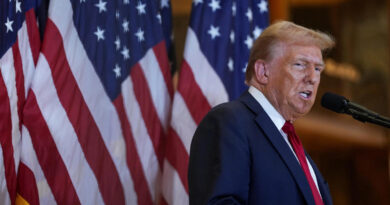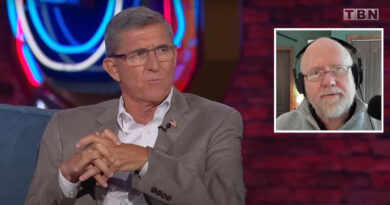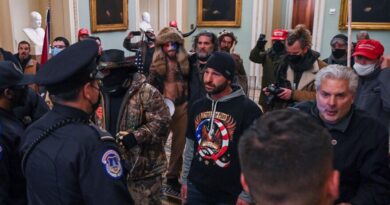QAnon Conspiracies, Proud Boys And The Future of Hawaii’s GOP
WASHINGTON — In June, Hawaii congressional candidate Ron Curtis shared a link to his Facebook page that’s since been flagged as false information.
“I rarely say this, but watch this video!!!” Curtis exclaimed.
“Once again, watch this video!!!”
“With the power of three for completeness, Watch this video!!!”
Curtis posted a tweet from a Twitter user known for pedaling QAnon conspiracy theories based on the false assertion that President Donald Trump is in an epic battle with a secret cabal of Satan worshipping pedophiles comprised of Democrats and Hollywood elites who are running a global sex trafficking ring that harvests the blood of children.
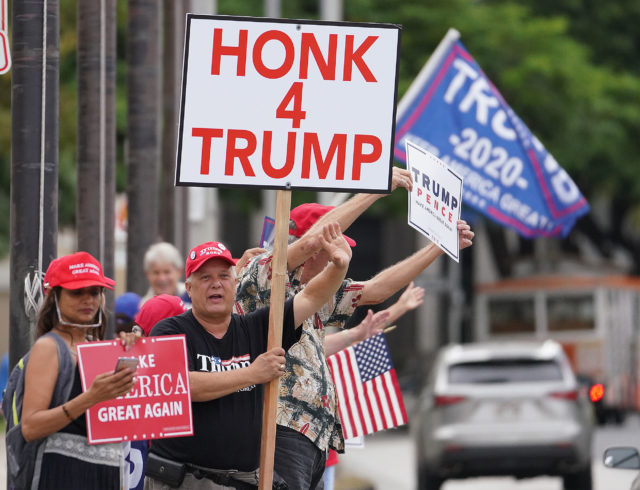
Trump supporters rally outside the Hawaii State Capitol.
Cory Lum/Civil Beat
The Twitter account has since been suspended and the video deleted, but the first line of the tweet, still visible on Curtis’ campaign Facebook page, states: “The QAnon movement must not become comatose.”
Curtis, who’s a relative unknown in local politics, will be near the top of the Republican ticket for many Hawaii voters, just below President Donald J. Trump, who’s facing off against former vice president Joe Biden in what many consider to be the most consequential election in modern history.
Curtis’ candidacy highlights the struggles the Hawaii GOP faces when it comes to finding relevance in a state dominated by Democrats, but he’s not alone.
The Republican Party is thin on talent, so much so that it didn’t field challengers in nearly half of the state legislative races on the 2020 ballot. Still, that was an improvement over previous election years.
Curtis is a former NASA contractor who’s running against U.S. Rep. Ed Case in Hawaii’s 1st Congressional District, which represents Oahu’s urban core, including metropolitan Honolulu.
He currently lives on Kauai and said he has no intention of moving into the district even if he wins. The only time he’s lived on Oahu was for three years in elementary school when his father, a lieutenant colonel in the Army, was stationed at Schofield Barracks.

Ron Curtis
Courtesy
Curtis ran an unsuccessful campaign in 2018 against U.S. Sen. Mazie Hirono and has raised almost no money in his quest to take on Case.
The only reason he decided to run, he said, was to give voters a choice, although he shares similar views with the congressman on the need for campaign finance reform and abolishing the Jones Act, a 100-year-old law that regulates shipping to the islands.
When it comes to QAnon, Curtis said, “I listen to everyone.”
He said he’s shared QAnon content from one of his Republican primary opponents, James Dickens, who has posted selfie videos online taking an oath in support of the conspiracy, to help boost Dickens’ campaign and help voters make “informed decisions.”
While Curtis himself says he doesn’t believe that there’s a global conspiracy, he said the QAnon “phenomenon” does give conservatives the incentive to go out and do their own research.
“If I know something’s false I won’t retweet it. If I’m not sure, I’ll retweet it and leave it to the people on Twitter.” — Ron Curtis
When asked about whether he was concerned about spreading misinformation, he deferred to the internet to hold him accountable.
“For me, it’s like a political scavenger hunt,” Curtis said. “If I know something’s false I won’t retweet it. If I’m not sure, I’ll retweet it and leave it to the people on Twitter. If it’s false they’ll let me know real quick.”
Among the other Republicans who have stepped forward in 2020 is Nicholas Ochs, who’s running for the state House of Representatives in a district that includes Waikiki, Kakaako and Ala Moana.
Ochs is the founder of the Hawaii chapter of the Proud Boys, a far-right organization of Trump supporters with a penchant for political violence.
The Proud Boys have been described by the Southern Poverty Law Center as a hate group, and its members are known for espousing misogynistic, anti-Muslim, anti-immigrant rhetoric that’s often dressed up as “Western chauvinism.”

Nick Ochs, president of Proud Boys of Hawaii, is at right. He declined to identify his colleague.
Courtesy Nich Ochs
They also marched alongside neo-Nazis and the KKK at the Unite the Right rally in Charlottesville, North Carolina, that left one woman dead after a man rammed his car into a group of counter protestors.
During the presidential debate last month, Trump told the Proud Boys to “stand back and stand by” after being asked whether he would denounce white supremacy.
Ochs and the Proud Boys, however, say they’re not racist, with Ochs in particular pointing to the fact that he’s married to a Black woman.
On the other hand, Ochs does consider himself a nationalist, which he says is different from being a “white nationalist.”
“I choose my words carefully,” Ochs said. “I know that leftists would love to have nationalist stand as a slur in its own right, but it’s not. A nationalist is someone who puts his country first, and I don’t think that’s a particularly controversial statement.”
Using the law to crack down on homelessness is a top priority, he said.
He described himself as the most right-wing member of the Hawaii GOP, and said he appreciates the fact the party has given him a chance to run for office rather than denouncing him outright because of his affiliation with the Proud Boys.
“I’m not sure I would have made it in New York state,” he said.
A Party In ‘Shambles’
The fact that Curtis and Ochs are the best the Republican Party has to offer in their respective races could spell trouble for the Hawaii GOP as a whole, according to political experts.
“The first thing it says is that the Republican Party is in shambles,” said Neal Milner, professor emeritus of political science at the University of Hawaii.
“It’s scary and it’s shameful that those people are representing the Republican Party, and the Republican Party should feel very bad about that. But this doesn’t show to me an ideological shift within the party. It shows to me a vacuum because the Republican Party has so little clout in this state and so few voters behind it.”
Since statehood in 1959, the Hawaii GOP has lumbered toward extinction as the Democratic establishment tightened its chokehold on the levers of power, from the Legislature to the governorship to the people it sends to Congress.
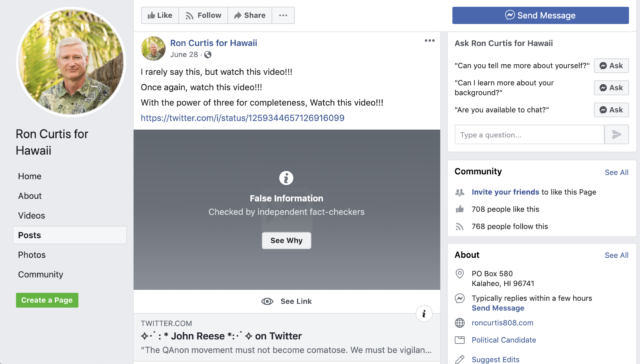
A screenshot from the Ron Curtis campaign Facebook page shows him sharing QAnon content.
Screen shot
Only one Republican has a seat in the state Senate while five others serve in the 51 member House of Representatives.
Republican presidential candidates don’t fare much better in the Aloha State. For instance, Trump only received about 29% of the vote in 2016, which is slightly less than the average vote total of 33% for GOP candidates dating back to 1992.
Linda Lingle, a Republican, was Hawaii’s governor from 2002 to 2010, but she rose to power at a time the state economy was struggling and a number of Democratic politicians were embroiled in corruption scandals involving everything from campaign finance violations and kickbacks to tax evasion and drunken driving.
In short, Lingle offered an alternative to voters who were fed up with the party in power.
“We’re far away in Hawaii, but we’re not insulated from the impact of the continent’s dominant two party platform.” — Ngoc Phan, Hawaii Pacific University
Ever since, the GOP has struggled to gain much traction in Hawaii. If anything, the party has regressed. Some of the GOP’s brightest stars — Duke Aiona, Charles Djou, Beth Fukumoto and Andria Tupola — have switched parties, run for nonpartisan office or left politics altogether.
With such a thin bench, Colin Moore, director of the Public Policy Center at the University of Hawaii, said that candidates with little name recognition and those who operate on the fringes of the party fill in the spaces left behind.
“People who are otherwise Republicans run as Democrats because there is no other path to power,” Moore said. “As the Republican Party increasingly becomes a rump party only the most extreme partisans are left.”
The Hawaii GOP isn’t totally to blame, he said. After Barack Obama was elected president in 2008, Moore said the Republican Party as a whole started drifting farther to the right with the emergence of the Tea Party.
When Donald Trump was elected in 2016 the chasm between Hawaii’s traditional brand of moderate Republicanism and the president’s nationalist, anti-immigrant policies only grew deeper. Trump’s refusal to denounce white supremacy and his dog whistle rhetoric that many consider racist have only further alienated Hawaii voters, who are among the most ethnically diverse in the country.
“I think the GOP’s association with Trumpism put the nail in the coffin of the Hawaii Republican Party,” Moore said. “I don’t say that to celebrate it. I think democracy doesn’t function well without two party competition. I wish I could say that the Republican renaissance was right around the corner, but I don’t think so. They’re going to have to spend years in the wilderness.”
Ngoc Phan, who’s an assistant professor of political science at Hawaii Pacific University, agrees, and said she’s not surprised Hawaii has seen the emergence of candidates affiliated with QAnon and the Proud Boys in the 2020 election.
Trump normalized and emboldened the radical right, she said, which is why candidates touting conspiracy theories, racial intolerance and political violence are appearing on ballots across the U.S.
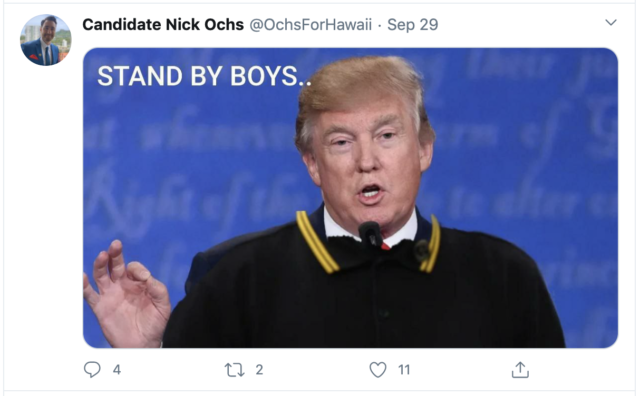
Many Proud Boys, including Ochs, celebrated Trump’s message for them to “stand back and stand by.”
Screen shot
In Georgia, Marjorie Taylor Greene, who adheres to the QAnon conspiracy theory, is all but assured a seat in Congress after winning the Republican primary in a deeply red district. The president of the Proud Boys, Enrico Tarrio, has also said there are numerous members of his group running for office across the country, but refused to identify them by name.
While some in the Republican Party have stood up to Trump, Phan said, many others have defended his conduct, stayed silent or come up with excuses to avoid his ire. The Hawaii GOP has similarly embraced the president.
“The Republican Party nationally and across the states has capitulated to President Trump and his agenda,” Phan said. “We’re deeply polarized so party members here are much more likely to toe the line than go along with the other side. We’re far away in Hawaii, but we’re not insulated from the impact of the continent’s dominant two party platform.”
‘We’re A Super Minority In Hawaii’
Andria Tupola knows there’s a struggle ahead for the Hawaii GOP.
She’s a former state legislator who is considered one of the brightest stars in the Republican Party. When she ran against Gov. David Ige in 2018, she only received 33% of the vote, which is only slightly better than what most Republican presidential candidates pull in Hawaii during a general election.
This year Tupola ran for a nonpartisan seat on the Honolulu City Council and won outright in the primary by securing more than 50% of the votes in a five-way race.

Andria Tupola is among the Republican Party’s brightest stars in Hawaii.
Ronen Zilberman/Civil Beat
For Republicans to be successful in Hawaii, she said, they’re going to have to work from the ground up, especially if they want to have any shot at higher office whether it’s the governorship or a seat in Congress.
“We’re a super minority in Hawaii and we should definitely focus on building up our foundation,” Tupola said. “We need to build our bench, and part of us becoming successful in larger races is understanding that recruiting and identifying credible upstanding candidates is a process. It doesn’t happen overnight.”
Tupola didn’t want to comment on Curtis or Ochs because she hasn’t been involved in their races.
Republicans in general have a hard time in Hawaii, Tupola said, and she has been working with a handful of candidates, including Kelly Kitashima, to help them gain a foothold.
Among the lessons she tries to teach are that the constituent’s concerns come first and how you define yourself matters.
For example, Kitashima confronts her conservatism on her campaign flyers. Not only does she define herself as a moderate Republican, she further explains that while she believes in less government regulation and lower taxes she’s also a supporter of LGBTQ+ and women’s rights as well as an advocate for the environment.
“You don’t run for office to go represent the Republican Party,” Tupola said. “You run for office to represent your district.”
Rebuilding The Foundation
No single candidate should define the Hawaii GOP, according to Shirlene Ostrov, the party’s chairwoman. Neither should Donald Trump, she said, even though she does support him and his policies.
“I believe in our president, but that’s not why I’m sitting in this seat,” she said. “I’m sitting in this seat so that we give our voters a choice in this election.”
Ostrov chose her words carefully when talking about Curtis and Ochs. She said she didn’t want to comment specifically on QAnon or the Proud Boys, but wanted to express her party’s support for the candidates as individuals.
Although she refused to defend the Proud Boys as an organization, she did push back on any insinuation that Ochs is affiliated with white supremacists. She pointed out that Ochs is a former Marine who’s married to a Black woman, and that such multiculturalism is part of the “Hawaii tapestry.”
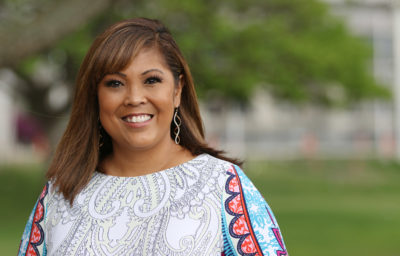
Shirlene Ostrov, who’s the chairwoman of the Hawaii GOP, is trying to steer the party in a more diverse direction.
Cory Lum/Civil Beat
“A candidate who has served his nation so honorably, who is in a very beautiful, diverse marriage and is eager to step up and run for office is somebody that we’re proud of,” Ostrov said.
“It’s just hard for me to believe that people would think a white supremacist would be married to a Black woman. We’re looking at the content of his work, his character and the things he’s actually said, not the things that are attributed to him or the things that cannot be proven.”
The Hawaii GOP is not headed to the fringes, Ostrov said. If anything, it’s becoming more diverse and representative of the islands. More Republicans ran for office this year than in previous elections, she said, and the slate of candidates represent a wide array of ethnicities, ages and ideologies.
“In this extremely polarized political environment, we do not feel at all that we are far right,” she said. “We are center right, but staunchly and unapologetically conservative.”
Ostrov admits it will take years to build a viable two-party system in Hawaii, but she doesn’t see much choice.
One-party politics breeds corruption, she said, because there are fewer checks and balances on those who are in power. Island residents have witnessed the results first hand, she said, as the U.S. Justice Department has conducted criminal investigations into major institutions, including the Honolulu Police Department and the city’s $10 billion rail project.
The recent arrest of Martin Kao, a defense contractor who’s a prolific political donor, is just the latest example, she said.
“We need a loyal opposition because I don’t think anybody loves the corruption that has taken over state politics,” Ostrov said. “A loyal opposition will provide the balance needed to keep everybody honest.”
Whether voters go for it is another question. The election is just 23 days away.
 <!–
<!–  –> <!– Sign up for our FREE morning newsletter and face each day more informed. –> Sign up for our FREE morning newsletter and face each day more informed.
–> <!– Sign up for our FREE morning newsletter and face each day more informed. –> Sign up for our FREE morning newsletter and face each day more informed.
Sorry. That’s an invalid e-mail.
Thanks! We’ll send you a confirmation e-mail shortly.
*** This article has been archived for your research. The original version from Honolulu Civil Beat can be found here ***
